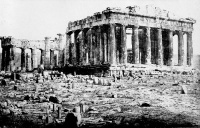Western world
From The Art and Popular Culture Encyclopedia
| Revision as of 21:31, 2 December 2013 Jahsonic (Talk | contribs) ← Previous diff |
Revision as of 15:38, 20 June 2014 Jahsonic (Talk | contribs) Next diff → |
||
| Line 2: | Line 2: | ||
| [[Image:Western face of the Greek Parthenon.jpg|thumb|right|200px|[[1872]] [[photograph]] of the western face of the [[Greek]] [[Parthenon]]]] | [[Image:Western face of the Greek Parthenon.jpg|thumb|right|200px|[[1872]] [[photograph]] of the western face of the [[Greek]] [[Parthenon]]]] | ||
| {{Template}} | {{Template}} | ||
| - | The term '''Western world''' or "'''the West'''" (also on rare occasions called the '''Occident''') can have multiple meanings depending on its context (i.e. the time period and the used criteria). Even definitions of what constitutes the West today vary. In general however there is a consensus that the West includes ''at least'' [[Australia]], [[Canada]], [[New Zealand]], the [[United States]], and [[Western Europe]]. | ||
| - | In other definitions, [[Eastern Europe]], [[Latin America]], [[Japan]], [[Turkey]], and [[Israel]] are often included, as their cultures are closely linked. | + | The '''Western world''', also known as '''the West''' and the '''Occident''' (from [[Latin]]: ''occidens'' "sunset, West"; as contrasted with the [[Orient]]), is a term referring to different nations depending on the [[Context (language use)|context]]. There are many accepted definitions about what all they have in common. |
| + | |||
| + | The concept of the Western part of the earth has its roots in [[Greco-Roman civilization]] in Europe, and the advent of [[Christianity]]. In the modern era, [[Western culture]] has been heavily influenced by the traditions of the [[Renaissance]], [[Protestant Reformation]], [[Age of Enlightenment]]—and shaped by the expansive [[colonialism]] of the 15th-20th centuries. Before the [[Cold War]] era, the traditional Western viewpoint identified Western Civilization with the [[Western Christian]] ([[Catholic]]-[[Protestant]]) countries and culture. Its political usage was temporarily changed by the antagonism during the Cold War in the mid-to-late 20th Century (1947–1991). | ||
| + | |||
| + | The term originally had a literal geographic meaning. It contrasted [[Europe]] with the linked cultures and civilizations of the [[MENA|Middle East and North Africa]], [[South Asia]], [[Southeast Asia]] and remote [[Far East]], which early-modern Europeans [[East–West dichotomy|saw as the East]]. Today, this has little geographic relevance, since the concept of West expanded to include the former European colonies in the Americas, Russia expands to Northern Asia and Australia and New Zealand are part of Oceania. | ||
| + | |||
| + | In the contemporary cultural meaning, the phrase "Western world" includes Europe, as well as many countries of European colonial origin with substantial European ancestral populations in [[the Americas]] and [[Oceania]]. | ||
| == As a synonym for 'developed countries' == | == As a synonym for 'developed countries' == | ||
Revision as of 15:38, 20 June 2014
|
Related e |
|
Featured: |
The Western world, also known as the West and the Occident (from Latin: occidens "sunset, West"; as contrasted with the Orient), is a term referring to different nations depending on the context. There are many accepted definitions about what all they have in common.
The concept of the Western part of the earth has its roots in Greco-Roman civilization in Europe, and the advent of Christianity. In the modern era, Western culture has been heavily influenced by the traditions of the Renaissance, Protestant Reformation, Age of Enlightenment—and shaped by the expansive colonialism of the 15th-20th centuries. Before the Cold War era, the traditional Western viewpoint identified Western Civilization with the Western Christian (Catholic-Protestant) countries and culture. Its political usage was temporarily changed by the antagonism during the Cold War in the mid-to-late 20th Century (1947–1991).
The term originally had a literal geographic meaning. It contrasted Europe with the linked cultures and civilizations of the Middle East and North Africa, South Asia, Southeast Asia and remote Far East, which early-modern Europeans saw as the East. Today, this has little geographic relevance, since the concept of West expanded to include the former European colonies in the Americas, Russia expands to Northern Asia and Australia and New Zealand are part of Oceania.
In the contemporary cultural meaning, the phrase "Western world" includes Europe, as well as many countries of European colonial origin with substantial European ancestral populations in the Americas and Oceania.
As a synonym for 'developed countries'
See also
- Americanization
- Anglicisation
- Anglosphere
- Francophonie
- Golden billion
- Hispanic world
- Indo-European languages
- Lusophone
- Russophone
- Europeanisation
- Russification
- Western culture
- Western mystery tradition
- Westernisation
- Organisations



